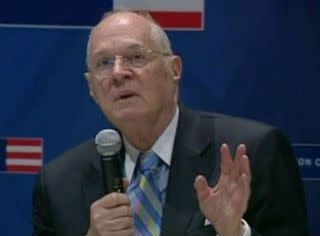Justice Anthony Kennedy talks about the Bill of Rights at National Constitution Center

Justice Anthony Kennedy
In his first visit to the National Constitution Center, U.S. Supreme Court Justice Anthony Kennedy spoke to an audience of high school students on Monday about our nation’s founding documents.
The Justice peppered students from Constitution High School and Roman Catholic High School with questions about the Constitution. For example, he asked, how are Article I and Article II written differently? What are the powers of Congress versus the powers of the presidency?
“Don’t think you’re peeking!” he joked as the students consulted their pocket-size copies of the document. “I want you to peek! I want you to read the Constitution.”
Kennedy honed in on the significance of the nation’s first President, George Washington, who helped establish the American constitutional order in the face of strong disagreement among delegates at the Constitutional Convention and in light of Article II powers that are, at times, unclear.
“[The framers] weren’t quite sure what the President would do, but they assumed it would be Washington, and they trusted him,” he explained. “Trust is an essential component of a free society, an open society, a rational society.”
Kennedy also highlighted the importance of Isaac Newton, “the poster boy for the Enlightenment” who demonstrated that “the human mind, of its own force, can discover the laws of nature.”
“The Framers were showing that they could discover the laws of government,” he said. “They, like Newton in the scientific world, could write laws and principles that would govern our political life. That’s the link between the two.”
In his wide-ranging talk, Kennedy touched upon the fallout from Texas v. Johnson (1989), a famous case in which the Court ruled flag-burning to be constitutionally protected free speech.
The Justice told the story of a lawyer who confronted him at a diner in California. The man’s father had been a prisoner of war in Germany and was outraged by the Court’s ruling, telling his son that he ought to be ashamed to practice law.
Three days later, after thinking more about the decision, the man’s father came back. He said his son could be proud to be a lawyer.
“That’s the process of thinking about what the Constitution means in your own times, so that we can keep it,” Kennedy said. “In a couple more years, you’re going to be the trustees of the Constitution, not me. That’s why we want you to understand this heritage and its meaning.”
Kennedy also explored a chief purpose of the Bill of Rights—namely, to correct the erroneous construction of “freedom” enshrined in the original document.
“If you read Article I, Section 2, you’ll see a derivative of the word ‘freedom’ because the Constitution uses the word ‘free Persons,’” he explained. “It uses ‘freedom’ in this ironic sense of saying that some people have no freedom, or three-fifths of freedom.”
Justice Kennedy also took questions from the audience.
“I want you to do research and understand corrections and prison policies in this country,” he implored in response to a question from a sitting trial judge in Pennsylvania. “My state of California, for a time, had 200,000 people in prison at a cost of $30,000 a year. Compare $4,000 a year being given to elementary and secondary schools. It’s a little bit of apples and oranges … but if I have to take an economic calculus to get people to think about human cost, I’ll do it.”
“We’re fascinated with the guilt and innocence part of the project, and once it’s over, the sentencing, we throw away the key—we don’t care what happens in the prison system,” he added. “This is wrong.”
Later, Kennedy called out a recent cover of Foreign Affairs that depicts the U.S. Capitol “crumbling” because of “the state of our public discourse.”
“The verdict on freedom is still out,” he declared. “Half the world is the jury and they are out. They are looking to you to see if freedom works.
“This country owes a duty to the Constitution, to itself and to the idea of freedom to conduct a decent, rational, respectful, probing civic discourse—and we don’t have it.”
The Justice also took on the meaning of privacy, his vote in Hobby Lobby v. Burwell (2014), the ancient Greek idea of freedom, and how he feels about being “one of the highest judges in America.”
Ultimately, though, Justice Kennedy shared a message of empowerment.
“[The Framers] knew that just because you write something beautiful in the Constitution, it doesn’t mean you’re going to keep it,” he said. “There has to be good faith. There has to be rational discourse. There has to be a commitment.
“You don’t take a DNA test to see if you believe in freedom. It’s taught. … That’s why you learn about the Constitution. [It] defines who we are as a people.
“Don’t ever let your Constitution slip away. The Constitution has meaning for you in your own times.”
Recent Stories on Constitution Daily
Constitution Check: Is the U.S. air war in Syria illegal?
Podcast: How our federal judicial system was born
Why didn’t the original 12 amendments make it into the Bill of Rights?

